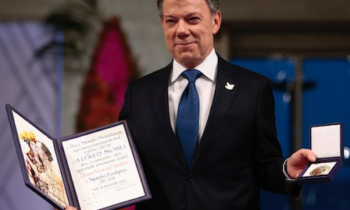 Colombian prosecutors said on Tuesday they suspect President Juan Manuel Santos, winner of the 2016 Nobel Peace Prize, received a bribe from scandal-plagued Brazilian construction firm Odebrecht for his 2014 re-election campaign.
Colombian prosecutors said on Tuesday they suspect President Juan Manuel Santos, winner of the 2016 Nobel Peace Prize, received a bribe from scandal-plagued Brazilian construction firm Odebrecht for his 2014 re-election campaign.
Colombian Attorney General Nestor Humberto Martínez announced that $1 million USD of bribe money that his office claims Brazilian construction firm Odebrecht paid to former Congress member Otto Nicolás Bula may have ended up under the management of the 2014 re-election campaign of President Juan Manuel Santos.
The shocking announcement came amid a sweeping international scandal in which Bula was detained last month for allegedly taking $4.6 million USD worth of bribes for his role in ensuring that Odebrecht won a lucrative contract for work on the country’s Ruta Ocaña-Gamarra highway. Some of those illicit funds were funneled to Panamanian and Chinese companies, said Martínez today, and it appears that the Santos campaign may have also been on the receiving end.
Roberto Prieto, manager of the 2014 Santos campaign, is expected to be the next in line to answer to the attorney general’s office and the National Election Council, which will conduct a further investigation. In a statement, Prieto denied the claims, saying that “never, but never, have I even shared a coffee” with Bula.
The Santos administration was even more forceful in denouncing the allegation, categorizing it as another attempt by the political opposition to implicate the president in a scandal. “History repeats itself,” said Camilo Enciso Vanegas, secretary of transparency for the Santos administration, claiming an ongoing strategy of the opposition to “defend itself by attacking with lies.”
Enciso detailed two other incidents he believes represent similar cases, adding that the campaign received no donations, was fully funded by legal means, and that Prieto should be trusted over those alleging that the campaign took $1 million USD of illicit funds.
“According to the attorney general, there is no evidence that the money has actually been paid to the manager of the Santos presidential campaign,” said Enciso. “It is the word of a delinquent … against the word of the campaign manager.”
The attorney general did not reveal the extent of the evidence. Martínez did say, however, that his office initiated a formal investigation into the 2014 election financing at the request of the rival Democratic Center political party. The party’s specific concern was regarding recent claims in the Brazilian media that a local advisor to Óscar Iván Zuluaga, who Santos of the Party of the U beat in the 2014 race, had received funds from Odebrecht.
What this could mean for Santos remains unclear. But particularly given the hostile, partisan climate in Colombia after a liberal Congress passed an unpopular peace accord and tax reform late last year, the fallout could be significant. Just last month, Santos said that fighting the “cancer” of corruption in Colombia would be his administration’s number-one priority for 2017, and now he finds his name attached to a potential scandal.
After the announcement, local television cameras and reporters caught up with Santos’ chief political rival — right-wing Democratic Center party head, current senator, and former President Álvaro Uribe — to hear his view on the news. “It is a serious moment,” said Uribe. He added only that he didn’t want to offer a public assessment until he had time to properly review the situation.
Santos, who served in Uribe’s cabinet as the minister of defense before falling out with his former boss, first won the presidency in 2010. He won re-election in 2014 in a two-candidate runoff with the Uribe-endorsed Zuluaga, sealing his return to the presidential palace Casa Nariño with a 51% to 45% margin in the vote.
(finance colombia)
